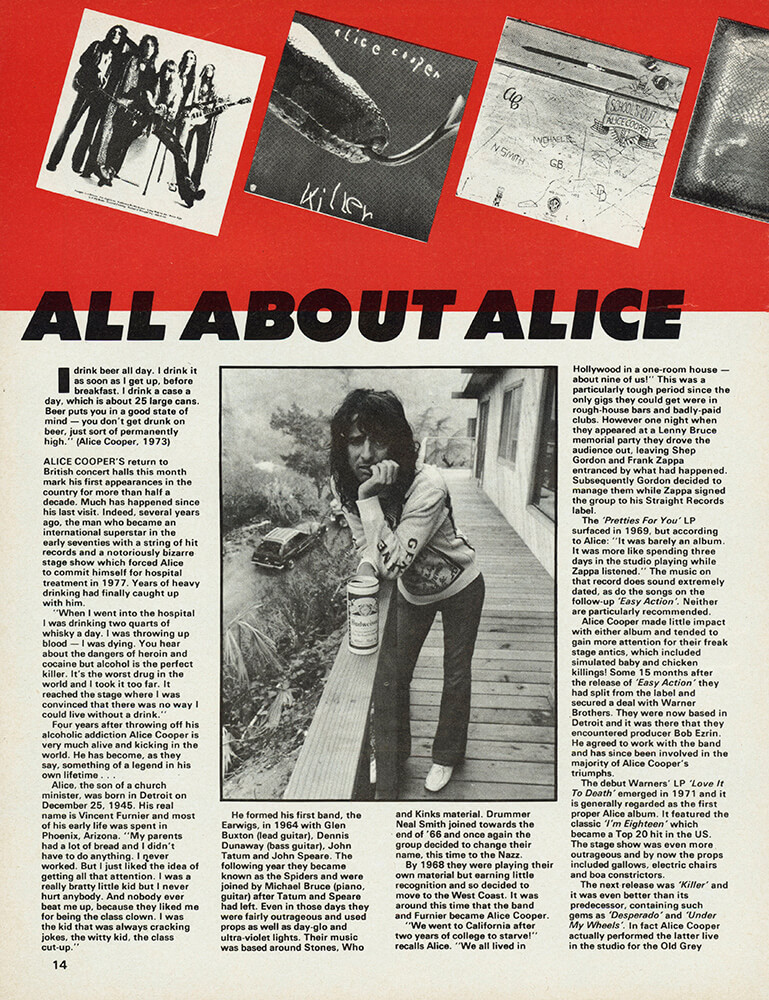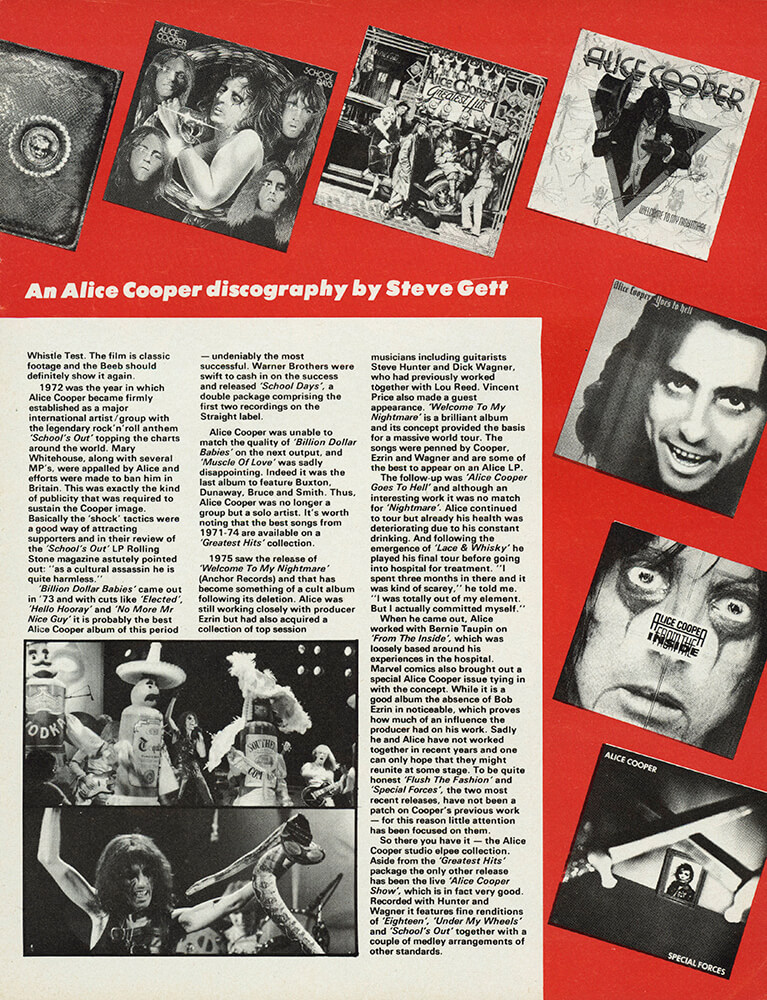Article Database

Kerrang!
February 11, 1982
All About Alice
An Alice Cooper Discography
Author: Steve Gett
"I drink beer all day. I drink it as soon as I get up, before breakfast. I drink a case a day, which is about 25 large cans. Beer puts you in a good state of mind — you don't get drunk on beer, just sort of permanently high." (Alice Cooper, 1973)
ALICE COOPER'S return to British concert halls this month mark his first appearances in the country for more than half a decade. Much has happened since his last visit. Indeed, several years ago, the man who became an international superstar in the early seventies with a string of hit records and a notoriously bizarre stage show which forced Alice to commit himself for hospital treatment in 1977. Years of heavy drinking had finally caught up with him.
"When I went into the hospital I was drinking two quarts of whisky a day. I was throwing up blood — I was dying. You hear about the dangers of heroin and cocaine but alcohol is the perfect killer. It's the worst drug in the world and I took it too far. It reached the stage where I was convinced that there was no way I could live without a drink."
Four years after throwing off his alcoholic addiction Alice Cooper is very much alive and kicking in the world. He has become, as they say, something of a legend in his own lifetime...
Alice, the son of a church minister, was born in Detroit on December 25, 1945. His real name is Vincent Furnier and most of his early life was spent in Phoenix, Arizona. "My parents had a lot of bread and I didn't have to do anything. I never worked. But I just liked the idea of getting all that attention. I was a really bratty little kid but I never hurt anybody. And nobody ever beat me up, because they liked me for being the class clown. I was the kid that was always cracking jokes, the witty kid, the class cut-up."
He formed his first band, the Earwigs, in 1964 with Glen Buxton (lead guitar), Dennis Dunaway (bass guitar), John Tatum and John Speer. The following year they became known as the Spiders and were joined by Michael Bruce (piano, guitar) after Tatum and Speer had left. Even in those days they were fairly outrageous and used props as well as day-glo and ultra-violet lights. Their music was based around Stones, Who and Kinks material. Drummer Neal Smith joined towards the end of '66 and once again the group decided to change their name, this time to the Nazz.
By 1968 they were playing their own material but earning little recognition and so decided to move to the West Coast. It was around this time that the band and Furnier became Alice Cooper.
"We went to California after two years of college to starve!" recalls Alice. "We all lived in Hollywood in a one room house — about nine of us!" This was a particularly tough period since the only gigs they could get were in rough-house bars and badly-paid clubs. However one night when they appeared at a Lenny Bruce memorial party they drove the audience out, leaving Shep Gordon and Frank Zappa entranced by what had happened. Subsequently Gordon decided to manage them while Zappa signed the group to his Straight Records label.
The 'Pretties For You' LP surfaced in 1969, but according to Alice: "It was barely an album. It was more like spending three days in the studio playing while Zappa listened." The music on that record does sound extremely dated, as do the songs on the follow-up 'Easy Action'. Neither are particularly recommended.
Alice Cooper made little impact with either album and tended to gain more attention for their freak stage antics, which included simulated baby and chicken killings! Some 15 months after the release of 'Easy Action' they had split from the label and secured a deal with Warner Brothers. They were now based in Detroit and it was there that they encountered producer Bob Ezrin. He agreed to work with the band and has since been involved in the majority of Alice Cooper's triumphs.
The debut Warners' LP 'Love It To Death' emerged in 1971 and it is generally regarded as the first proper Alice album. It featured the classic 'I'm Eighteen' which became a Top 20 hit in the US. The stage show was even more outrageous and by now the props included gallows, electric chairs and boa constrictors.
The next release was 'Killer' and it was even better than its predecessor, containing such gems as 'Desperado' and 'Under My Wheels'. In fact Alice Cooper actually performed the latter live in the studio for the Old Grey Whistle Test. The film is classic footage and the Beeb should definitely show it again.
1972 was the year in which Alice Cooper became firmly established as a major international artist/group with the legendary rock'n'roll anthem 'School's Out' topping the charts around the world. Mary Whitehouse, along with several MP's, were appalled by Alice and efforts were made to ban him in Britain. This was exactly the kind of publicity that was required to sustain the Cooper image. Basically the 'shock' tactics were a good way of attracting supporters and in their review of the 'School's Out' LP Rolling Stone magazine astutely pointed out: "as a cultural assassin he is quite harmless."
'Billion Dollar Babies' came out in '73 and with cuts like 'Elected', 'Hello Hooray' and 'No More Mr Nice Guy' it is probably the best Alice Cooper album of this period — undeniably the most successful. Warner Brothers were swift to cash in on the success and released 'School Days', a double package comprising the first two recordings on the Straight label.
Alice Cooper was unable to match the quality of 'Billion Dollar Babies' on the next output, and 'Muscle Of Love' was sadly disappointing. Indeed it was the last album to feature Buxton, Dunaway, Bruce and Smith. Thus, Alice Cooper was no longer a group but a solo artist. It's worth noting that the best songs from 1971-74 are available on a 'Greatest Hits' collection.
1975 saw the release of 'Welcome To My Nightmare' (Anchor Records) and that has become something of a cult album following its deletion. Alice was still working closely with producer Ezrin but had also acquired a collection of top session musicians including guitarists Steve Hunter and Dick Wagner, who had previously worked together with Lou Reed. Vincent Price also made a guest appearance. 'Welcome To My Nightmare' is a brilliant album and its concept provided the basis for a massive world tour. The songs were penned by Cooper, Ezrin and Wagner and are some of the best to appear on an Alice LP.
The follow-up was 'Alice Cooper Goes To Hell' and although an interesting work it was no match for 'Nightmare'. Alice continued to tour but already his health was deteriorating due to his constant drinking. And following the emergence of 'Lace & Whisky' he played his final tour before going into hospital for treatment. "I spent three months in there and it was kind of scary," he told me. "I was totally out of my element. But I actually committed myself."
When he came out, Alice worked with Bernie Taupin on 'From The Inside', which was loosely based around his experiences in the hospital. Marvel comics also brought out a special Alice Cooper issue tying in with the concept. While it is a good album the absence of Bob Ezrin is noticeable, which proves how much of an influence the producer had on his work. Sadly he and Alice have not worked together in recent years and one can only hope that they might reunite at some stage. To be quite honest 'Flush The Fashion' and 'Special Forces', the two most recent releases, have not been a patch on Cooper's previous work — for this reason little attention has been focused on them.
So there you have it — the Alice Cooper studio elpee collection. Aside from the 'Greatest Hits' package the only other release has been the live 'Alice Cooper Show', which is in fact very good. Recorded with Hunter and Wagner it features fine renditions of 'Eighteen', 'Under My Wheels' and 'School's Out' together with a couple of medley arrangements of other standards.
Tour News
ALICE COOPER has added six extra British dates due to overwhelming public demand. Tickets for the first Manchester concert were all snapped up within three hours of going on sale! The dates are Brighton Conference Centre February 11, London Hammersmith Odeon 15-16, Manchester Apollo 17-18, Glasgow Apollo 19.
(Originally published in Kerrang! magazine, February 11 - 24, 1982)






